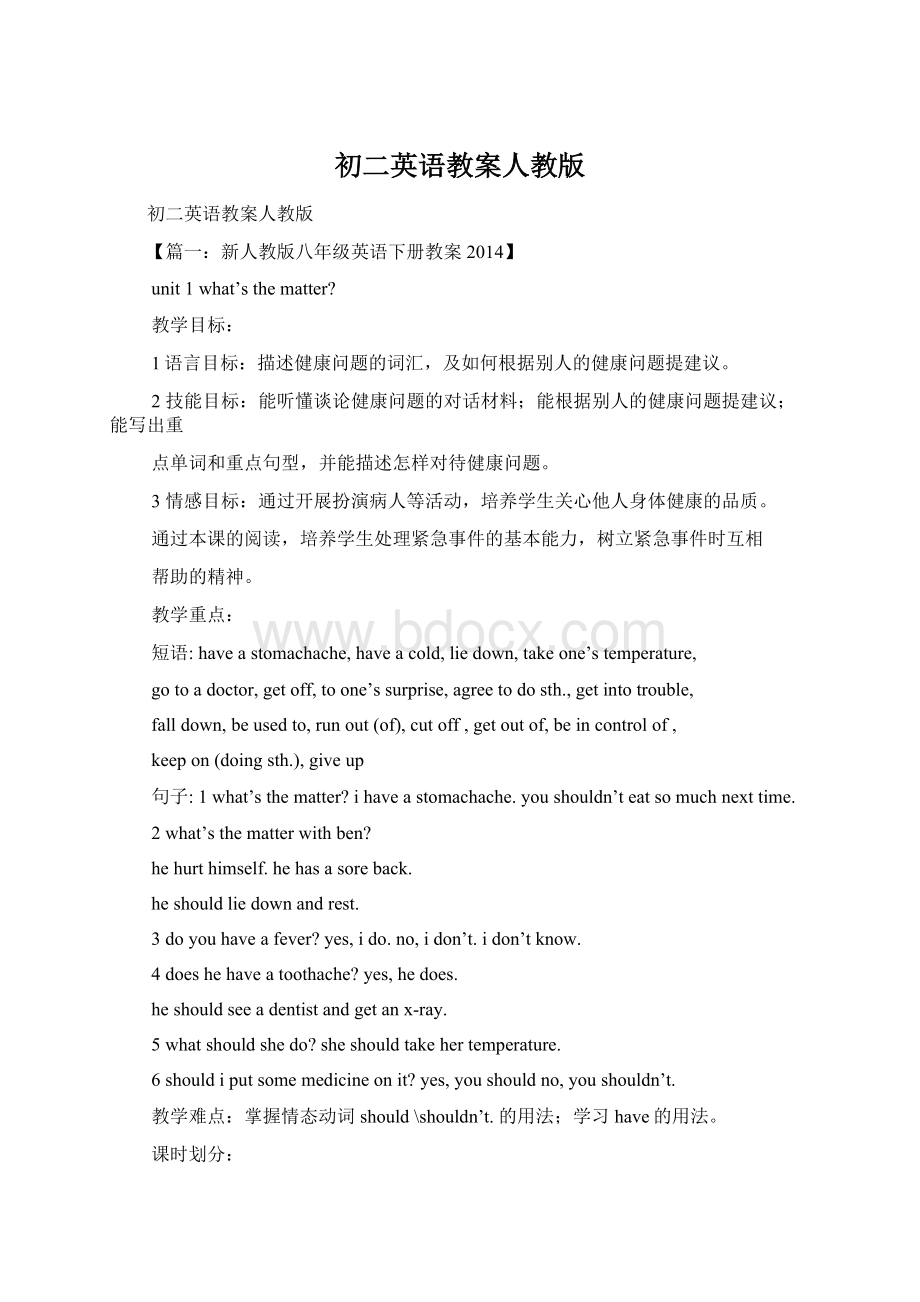初二英语教案人教版Word文档下载推荐.docx
《初二英语教案人教版Word文档下载推荐.docx》由会员分享,可在线阅读,更多相关《初二英语教案人教版Word文档下载推荐.docx(16页珍藏版)》请在冰豆网上搜索。

yes,hedoes.
heshouldseeadentistandgetanx-ray.
5whatshouldshedo?
sheshouldtakehertemperature.
6shouldiputsomemedicineonit?
yes,youshouldno,youshouldn’t.
教学难点:
掌握情态动词should\shouldn’t.的用法;
学习have的用法。
课时划分:
sectiona11a–2d
sectiona23a-3c
sectiona3grammarfocus-4c
sectionb11a-2e
sectionb23a-selfcheck
sectiona1(1a–2d)
step1warmingupandnewwords
1.lookatapictureandlearnthepartsofthebody.
2.newwordsandphrases.
step2presentation
1alookatthepicture.writethecorrectletter[a-m]foreachpartofthebody.
___arm___back___ear___eye___foot
___hand___head___leg___mouth
___neck___nose___stomach___tooth
step3listening
1blistenandlookatthepicture.thennumberthenames1-5
listentotheconversationsagainandfillintheblanks.
conversation1
nurse:
what’sthematter,sarah?
girl:
i___________.
conversation2
nurse:
what’sthematter,david?
boy:
i_________________.
conversation3
what’sthematter,ben?
conversation4
what’sthematter,nancy?
conversation5
betty:
what’sthematter,judy?
ann:
she__________________.
step4speaking
1clookatthepictures.whatarethestudents’problems?
makeconversations.
examples
a:
what’sthematterwithjudy?
b:
shetalkedtoomuchyesterdayanddidn’tdrinkenoughwater.
shehasaverysorethroatnow.
what’sthematterwithsarah?
shedidn’ttakecareofherselfontheweekend.shewasplayingwithherfriendsat
theparkyesterday.thenitgotwindy,butshedidn’tputonherjacket.nowshehas
acold.
step5guessinggames
guesswhathashappenedtothestudentsbyusingtheimportantsentences.
step6listening
2alistenandnumberthepictures[1-5]intheorderyouhearthem.
2blistenagain.matchtheproblemswiththeadvice.
step7speaking
2cmakeconversationsusingtheinformationin2aand2b
what’sthematter?
myheadfeelsveryhot.
maybeyouhaveafever.
whatshouldido?
youshouldtakeyourtemperature.
step8role–play
imagineyouaretheschooldoctor.afewstudentshavehealthproblems.role-playaconversationbetweenthedoctorandthestudents.
2drole–playtheconversation
step9languagepointsandsummary
1.what’sthematter?
这是人们特别是医生和护士询问病人病情时最常用的问句,意思是―怎么了?
‖其后通常与介词with连用。
类似的问句还有:
what’swrong?
怎么啦?
what’swrongwithyou?
你怎么了?
what’syourtrouble?
what’sthetroublewithyou?
what’sup?
2.haveacold伤风,感冒,是固定词组,表示身体不适的常用词组还有:
haveabadcold重感冒
haveafever发烧
haveaheadache头痛
haveastomachache肚子痛,胃痛
haveatoothache牙痛
summary:
1.牙疼haveatoothache
2.胃疼haveastomachache
3.背疼haveabackache
4.头疼haveaheadache
5.喉咙疼haveasorethroat
6.发烧haveafever
7.感冒haveacold
8.躺下并且休息liedownandrest
9.喝热蜂蜜茶drinkhotteawithhoney
10.喝大量水drinklotsofwater
11.看牙医seeadentist
12.量体温takeone’stemperature
13.看医生gotoadoctor
step10exercises
根据上下文意思填空。
mandy:
lisa,areyouok?
lisa:
i_____aheadacheandican’tmovemyneck.what______ido?
shouldi
_____mytemperature?
no,itdoesn’tsoundlikeyouhaveafever.what_____youdoonthe
weekend?
iplayedcomputer_____allweekend.
that’sprobablywhy.youneedtotakebreaks_____fromthecomputer.
yeah,ithinkisatinthe_____wayfortoolongwithoutmoving.
ithinkyoushould____downandrest.ifyourheadandneckstillhurttomorrow,then
gotoa_______.
ok.thanks,mandy.
翻译下列句子:
1.你怎么了?
我头痛。
2.他怎么了?
他发烧
3.李雷怎么了?
他喉咙痛。
他应该多喝水。
4.如果你的头和脖子明天仍然疼的话,请去看医生。
homework:
makeupaconversationbetweenadoctorandapatient.
sectiona2(3a–3c)
step1presentation
lookatthepicture.discusswhathappenedandthenwhatweshoulddo.
teacher:
whathappenedinthepicture.
students:
whatshouldwedotohelpthem?
didthebusdriverhelpthem?
step2reading
3areadthepassageandanswerthefollowingquestions.
doyouthinkitcomesfromanewspaperorabook?
howdoyouknow?
didthebusdriverhelpthemanandthewoman?
3breadthepassageagainandcheckthethingsthathappenedinthestory.
1____wangpingwasthedriverofbusno.26at9:
00a.m.yesterday.
2____busno.26hitanoldmanonzhonghuaroad.
3____theoldmanhadaheartproblemandneededtogotothehospital
rightaway.
4____thepassagersonthebusdidnotwanttogotothehospital,soonly
wangpingwentwiththewomanandoldman.
5____somepassagershelpedtogettheoldmanontothebus.
6____theoldmangottothehospitalintime.
step3speaking
3cdiscussthequestionswithapartner.
step4languagespoints
1....whenthedriversawanoldmanlyingonthesideoftheroad.
......这时司机看到一位老人正躺在路边。
观察与思考:
你能看出―看到某人正在做某事‖的句型吗?
seesb.doingsth.看见某人正在做某事
e.g.whenipassthewindowiseehimdrawingapicture.
seesb.dosth.看见某人做过某事
e.g.ioftenseehimdrawapicture.
活学活用:
1)我看见他时他正在河边玩。
isawhim_______bytheriver.
2)我看见过他在河边玩。
isawhim_____bytheriver.
3)我看着他过了桥。
iseehim______acrossthebridge.
4)我看见她正在洗碗。
iseeher_________thedishes.
2.thebusdriver,24-year-oldwangping,stoppedthebuswithoutthinkingtwice.
3.heonlythoughtaboutsavingalife.
你能看出―withoutthinking‖、―aboutsavingalife‖的共同点吗?
共同点:
介词+doing;
介词+名词、宾格代词、doing
用适当的形式填空。
1)iamfine.whatabout____(she)?
2)thanksfor______(tell)methestory?
3)itisasunnyday.howabout_____(go)fishing?
4)itisgoodtorelaxby______(use)theinternetor_________(watch)gameshows.
4.buttohissurprise,theyallagreedtogowithhim.
toone’ssurprise
使......惊讶的是,出乎......意料
e.g.totheirsurprise,allthestudentspasstheexam.
muchtoeveryone’ssurprise,theplansucceeded.
5....becausetheydon’twantanytrouble,...
当trouble意为―困难;
麻烦‖时,是不可数名词。
如:
i’msorrytogiveyousomuchtrouble.
(1)beintrouble意为―有困难;
陷入困境‖。
如:
healwaysasksmeforhelpwhenheisintrouble.
(2)getsb.intotrouble意为―使某人陷入困境‖。
ifyoucome,youmaygetmeintotrouble.
(3)主语+have/hastrouble(in)doingsth.意为―某人在做某事方面有困难‖。
如:
ihavesometrouble(in)readingtheletter.
当trouble意为―麻烦事;
烦心事‖时,是可数名词。
shewasonthephoneforanhourtellingmehertroubles.
【运用】根据汉语意思完成英语句子,每空词数不限。
(1)他认为每天吃饭是一件麻烦事。
hethinksthateatingeverydayis_________.
(2)你知道你现在为什么处于困境吗?
doyouknowwhyyou_____________now?
(3)我妹妹在学习英语方面有困难。
mysister_____________________english.
6.rightaway意为―立刻;
马上‖,和inaminute意思相近。
例如:
i’llbethererightaway/inaminute.
另外,rightnow和atonce也可表示―立刻;
马上‖的意思。
你必须马上出发。
youmuststart_________________________________________.
重点短语
1)看到某人正在做某事seesb.doingsth.
2)让某人吃惊的是toone’ssurprise
3)下车getoffthebus
4)上车getonthebus
5)多亏,幸亏thanksto
6)考虑thinkabout
7)同意做某事agreetodosth
8)造成麻烦getintotrouble
step5exercises
用括号内的词的适当形式填空。
1.thedriversawanoldman_____(lie)ontheroad.
2.isatinthesamewaywithout________(move).
3.heonlythoughtabout______(save)alifeanddidn’tthinkabout_______(him).
4.theoldmanneeded_____(go)tothehospital.
5.awomanwas________(shout)forhelp.
6.heexpectedthem______(get)offthebus.
sectiona3(grammarfocus–4c)
step1revision(guessinggame)
lookatthepictures,guesswhathashappenedandrevisetheimportantpointsthestudentshavelearned.
【篇二:
新人教版八下英语全册教案】
一、教学目标:
1.语言知识目标:
1)能掌握以下单词:
foot,knee,neck,stomach,throat...
2)能掌握以下句型what’sthematter?
ihaveaheadache.youshoulddrinksometea.thatsoundsalikeagoodidea.ihaveasoreback.
二、教学重难点:
1)talkaboutyourhealth.2)makesuggestions.
三、教学方法:
revision,learning,practiceandreading.
四、教学辅助:
tape-recorderandlattern.
五、课时:
sixperiods
六、教学过程:
period1(sectiona1a-2d)
i.teachingaimsanddemands
1.knowledgeobjects.bodynames.illness.what’sthematter?
ihaveacold.
2.abilityobjects.listeningskill.recognizingskill.
3.moralobjects.exerciseeverydayandkeephealthyandstrong.
ii.teachingimportanceanddifficulty
iii.teachingmethods
recognizingmethodlisteningmethod.discovermethod.pairwork.
iv.teachingaids
ataperecorder.adollforteachingthenamesofthebody.aprojector.
v.teachingprocedures
lead-innamethepartsofthebodybypictures.
step1readachantaboutthebody.
step2enjoyasong.
step3playagame.sayanddrawthepartofbody.
step4activity1a.
letsstolookatthepictureandwritethecorrectletter[a-m]foreachpartofthebody.step5judgetheirproblemsbasedoneverypicture.
step6activity1b.
listenandlookatthep